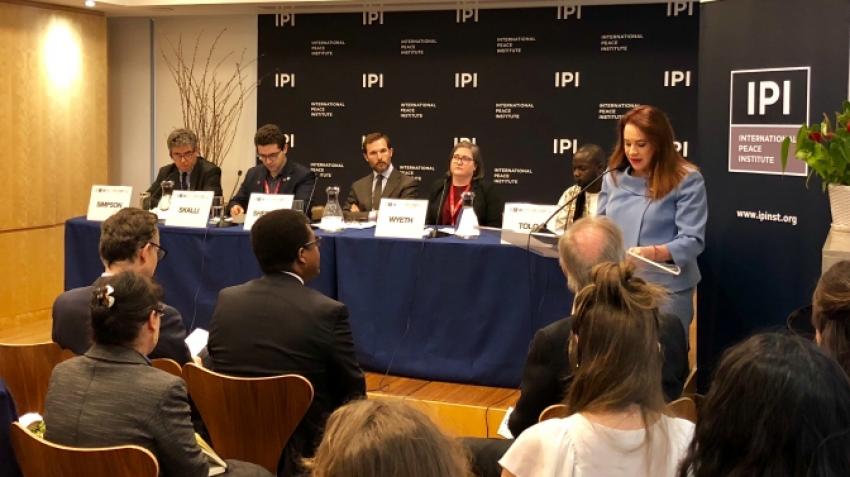The International Peace Institute held a policy forum panel discussion on Meaningful Inclusion of Young People as Drivers of Peace on the margins of the 2019 ECOSOC Youth Forum to highlight the need for young people to have a seat at the table in all policy discussions. The event was cosponsored by the Office of the President of the United Nations General Assembly, the UN Peacebuilding Support Office, the UN Population Fund, Peace Direct, and Interpeace.
UN General Assembly President María Fernanda Espinosa Garcés, in opening the discussion, noted that youth perspectives are still viewed by some as something novel or nice to have rather than integral to discussion. Having devoted much of her presidency to ensuring the UN is accessible and relevant for all, which has included a focus on youth, peace and security as an official top priority, President Espinosa said the narrative around youth inclusion in global issues must shift from the perception of youth as a demographic time bomb of unemployment, fertility and violence, to recognition of the demographic dividend of a generation that is the largest, most educated and most globally minded in history. Citing the Missing Peace Report, which lays out the extent to which policy makers still see young people as a problem, President Espinosa said we must find ways to convince politicians and the media to adopt a more positive narrative, and ensure young people are included in broader decision making, as we will not make progress on youth peace and security without making progress on broader civic, political and economic inclusion of young people.
The panel included several speakers from a variety of positions, including Moussa Tolo, president of Allô Gouvernance, Vanessa Wyeth, Senior Political and Public Affairs Officer (Peacebuilding) of the Permanent Mission of Canada to the UN, Adil Skalli, Program Manager with the United Nations Association in Canada and Graeme Simpson, Principal US Representative and Senior Peacebuilding Adviser of Interpeace USA, who all aptly demonstrated not only the potential, but the necessity of youth voices in peace and conflict prevention.
UN Security Council Resolutions 2250 and 2419 were reoccurring points of reference across the panel. Adopted in 2015, Resolution 2250 recognizes that young people play an important and positive role in the maintenance and promotion of international peace and security; identifies five key points for action: participation, protection, prevention, partnerships and disengagement, and reintegration; and urges Member States to give youth voices greater emphasis in policy matters at all levels. Resolution 2419, adopted unanimously by the Security Council in June 2018 calls on all relevant actors to consider ways for increasing the representation of young people when not only implementing, but also negotiating peace agreements, recognizing that the marginalization of youth voices is detrimental to building sustainable peace and countering violent extremism.
As emphasized by the event's panel, now more than ever is the time for youth to be more actively involved in the formation, creation and implementation of policy, at the local, national, regional and international levels. As aptly highlighted by IPI Vice President Adam Lupel, what has become clear by the energetic participation of young people around the world on a whole host of issues is that young people do not simply represent the future. They are the present. They are showing leadership on many issues. They are not a problem for older people to solve, they are actively a part of the solution.
Video coverage of the event is available here.
Access United Nations Youth here, and learn about the UN Youth Delegate Program here.

